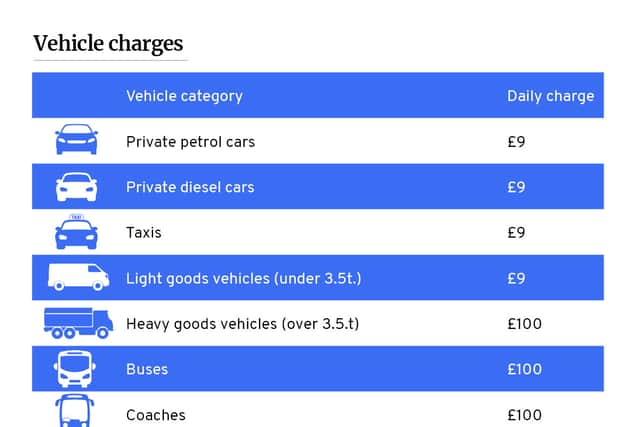Bristol Clean Air Zone: Third-generation family business under pressure as zone begins to impact footfall
and live on Freeview channel 276
The owner of a third-generation family store in Bristol believes the city’s council has begun to kill off independent businesses with its Clean Air Zone.
Marcruss Outdoors, on Hotwell Road, falls just within the boundary which came into effect on November 28. The business is run by Marcus and Adam Pinson and was founded by the pair’s granddad and father around 60 years ago. Marcus told Bristol World a flurry of customers entered his store in the week before the zone was introduced to stockpile items as they would not be returning once the CAZ charges began.
Advertisement
Hide AdAdvertisement
Hide AdMr Pinson explained: “The store has been a lot quieter since the zone. Obviously, the cold weather has not helped but there is less footfall. It is too soon to see how the zone will affect sales but it would not surprise us if quarterly figures were down.
“I have worked here for more than 30 years, the business has been running for more than 60 years. We will keep going until we are no longer able to, we are fortunate to own this wonderful building. After the pandemic, which we had to battle to get through, the council’s Clean Air Zone is another challenge we have to face. It seems the council is happy to kill off independent businesses for the sake of making some money through charges and fines.
“It has been a surprise to see how many of our customers are affected by the zone, it seems to largely be traders coming into the area for jobs or materials. In the lead-up to the zone, a rush of customers come through the door saying they would not be back for a while, if at all, because of the £9 charge. We have several loyal customers who are still making an effort but it is a struggle with the cost of living.”
The majority of registered vehicles in Bristol do not have to pay a charge when entering the zone. Older, more polluting models will have to pay. Bristol City Council claims it was a “moral and legal duty” which led to the CAZ’s introduction. There are four different classes of CAZ in operation, each targeting a different set of vehicles though Bristol’s zone, Class D, charges the widest range of vehicles including personal use cars. It also has the highest charge rate at £9.
Advertisement
Hide AdAdvertisement
Hide AdMarcus believes the authority’s claim of a “moral and legal duty” to introduce the zone is disingenuous, adding that the zone may cause certain drivers to pollute more as they drive further around the CAZ to avoid being charged.
He added: “If the zone was introduced to go down the green route then it could have been done differently, why charge people? Now the city will have people driving around its outskirts, meaning longer journeys and traffic build-up where there might not have been before. They [council decision makers] do not care about the little people in Bristol.”


A spokesperson for Bristol City Council disagreed with this, telling Bristol World: “The council has a moral and legal duty to ensure the city meets legal limits of air pollution in the shortest possible time. It is worth noting that approximately four out of five vehicles already meet the zone’s emissions standards so can carry on as usual without being charged.
“We have always sought to reduce air pollution to improve the city’s health while protecting Bristol’s businesses. The council has been working closely with Bristol’s business networks through the Clean Air Zone planning and preparation process and we’ve spoken to over 9,000 local businesses to date. The council secured £42 million – the most anywhere in the country – to help both businesses and residents upgrade their vehicles or find alternative ways to travel. This support is still available on our website: www.bristol.gov.uk/caz.”
Comment Guidelines
National World encourages reader discussion on our stories. User feedback, insights and back-and-forth exchanges add a rich layer of context to reporting. Please review our Community Guidelines before commenting.
